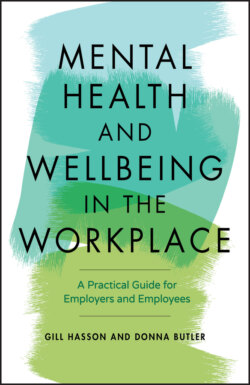Читать книгу Mental Health and Wellbeing in the Workplace - Gill Hasson - Страница 13
Wellbeing is Subjective
ОглавлениеA myriad of factors influence health and well-being, though many are familiar only to those who experience them.
Professor Dame Carol Black
Although there are key aspects to wellbeing – physical, mental and emotional, social and spiritual – wellbeing is subjective; each and every one of us has our own individual thoughts and beliefs about what makes for wellbeing. Our thoughts, ideas, beliefs, and experiences are framed in a narrative – we each have our own story – our own explanation or account of our wellbeing and what may or may not influence it.
For example, one person's account of their experience of depression and anxiety – how they feel, how they manage, and the extent of the impact on their wellbeing – will be different from someone else's experience and account. In another example, a person who is physically unwell or has a physical disability may feel that they have good levels of wellbeing despite illness or disability. Conversely, someone who is perceived as being well and ‘able bodied’ may believe and feel that they are not experiencing wellbeing to any great extent.
And, when it comes to traumatic experiences, professor of psychiatry at the University of North Carolina, Stephen Porges, suggests that the focus cannot be on the event, but on the individual reaction or response. ‘Much of our society defines trauma by the event when the real critical issue is the individual's reaction. By not accepting that, we end up saying: “If I can survive this and do well, why can't you?” So we start blaming the survivors again.’ Porges says that whatever the size or the intensity of the traumatic event ‘when a person has a reaction or response to trauma, the body interprets the traumatic event as a life threat’.
